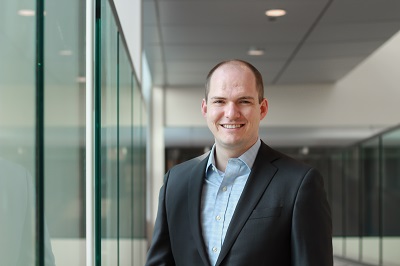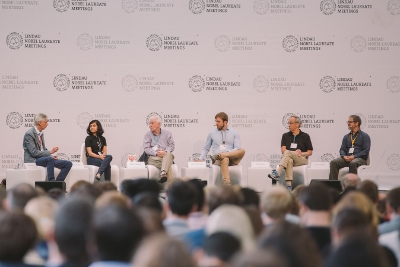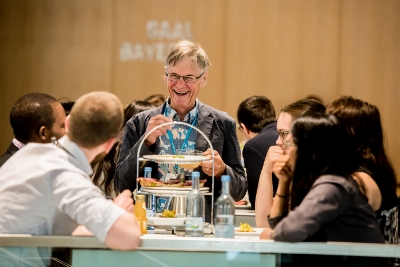
General surgery resident and PhD candidate Michael Laffin attended the 68th Nobel Laureate meeting on June 24 - 29, 2018.
Michael Laffin faced the opportunity of a lifetime when he was selected to attend the 68th Lindau Nobel Laureate Meeting in Germany from June 24-29, 2018. An annual tradition in Lindau since 1953, thirty-nine Nobel laureates met with more than 500 young scientists from around the world to discuss the hottest scientific topics of the day, in an effort to inspire tomorrow's scientific leaders. This year's meeting focused on physiology and medicine.
"It was incredible," Laffin said. "It was the best conference I've ever attended, in terms of inspiration, and just the number of incredible people and ideas that were discussed. There was someone at every table who has made a massive contribution to the world of science."
The University of Alberta general surgery resident and recent PhD graduate is only the third U of A student to attend the meeting, where he made lasting connections with peers and mentors who share an interest in his research on gastrointestinal disease and the microbiome.
Supervisors Karen Madsen and Bryan Dicken, and program director Kamran Fathimani, supported the 2017 Vanier scholar's nomination from the Canadian Institutes of Health Research (CIHR). Laffin says he feels especially proud to represent the U of A, the Faculty of Medicine & Dentistry (FoMD), and the Department of Surgery.
"You don't have to win the Vanier to go," Laffin added. "You can apply on your own, so if you're interested you should absolutely look into it. It's an incredible experience for graduate students at any level."
(Photo: Nobel Laureate panel discussion, courtesy of Julia Nimke/Lindau Nobel Laureate Meetings)

The universal language of science
Laffin says this was his first conference outside of North America, where he met colleagues from Asia and Europe whose ideas expanded his outlook on world health.
"Seeing how excited everyone around the world was about their ideas and about working toward a common goal of developing knowledge was really uplifting," he said. "Even though we do things a little differently and we don't always speak the same language, we're really speaking the common language of science and progress."
Each day of the conference was packed with mind-expanding discussions, lectures from Nobel laureates, and social opportunities to exchange ideas with scholars from around the world.
Though difficult for him to choose a single favourite moment, Laffin says that talking with Stanford physicist Steven Chu, 1997 Nobel laureate and U.S Secretary of Energy under President Obama, was a definite highlight.
"I had lunch with him and a couple of other young scientists, and hearing his opinions on the world and his approach to science was just incredibly impressive. It was really inspiring to see somebody achieve such a high level in all aspects of his life."
(Photo: Nobel Laureates converse with young scientists, courtesy of Patrick Kunkel/Lindau Nobel Laureate Meetings)

Juggling the roles of a physician-scientist
Another key interest of Laffin during the meetings was to get a better sense of how other physician-scientists bridged their clinical and scientific careers. The Nobel laureates in Lindau he spoke with confirmed it can be a challenge, and that institutional support is the key to balancing clinical and academic responsibilities. Laffin says he is grateful to have the support he needs to be successful from the U of A's Surgeon-Scientist program.
As a full-time surgical resident, Laffin works in his research lab a few times a week, but he says his primary focus is still caring for sick patients at the bedside, where he hopes his research will eventually be applied.
"I absolutely love being able to do my research and that's a huge priority for me. But the clinical world is just so rewarding in a very visceral and very immediate way. Being able to take the higher level, conceptual stuff that you learn in the lab, and bring it to the bedside and really help people is incredible."